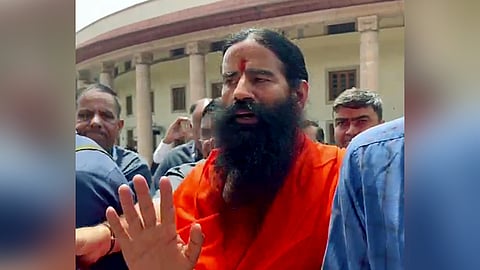

The case involving the personal appearance of Patanjali co-founders Baba Ramdev and Acharya Balkrishna before the Supreme Court has sparked a maelstrom of debate. At the genesis of this debate is an important question raised by the Supreme Court, echoing the collective conscience of the nation: Why did the Union government remain inert, turning a blind eye, as the company allegedly propagated false claims of cure and disseminated misleading advertisements?
This article delves into the intricacies of constitutional duty and societal protection, exploring whether the state bears a responsibility to shield private citizens from encroachments by other private entities. The Supreme Court’s comment, “Despite the contemnors spreading the narrative that their products were the definitive solution and cure, with no modern science alternative available... the Union government remained inactive. We are left pondering why the Union of India chose this course of inaction?” expresses the profound concern over the conspicuous absence of legal action by the Centre against Patanjali Ayurveda for its false claims and misleading advertisements.
The question then arises: why should the state intervene in a conflict between private entities when the Indian Medical Association (“the petitioner”), could potentially have pursued legal action under Section 4 of The Drugs and Magic Remedies (Objectionable Advertisements) Act, 1954, leading to the possible imprisonment of the alleged offenders?
But the need for state intervention becomes evident when examining the inaction of authorities like the State Licensing Authority in safeguarding the rights of the Indian Medical Association and the citizens of India. Thus, it becomes clear that the mere existence of legal avenues for private entities like the Indian Medical Association to pursue the remedies available does not absolve the state of its responsibility to intervene when necessary. In this case, the action—or rather, the inaction—of state authorities, such as the State Licensing Authority, as revealed in their affidavits, highlight a concerning pattern of negligence and avoidance of duty.
The court observed that despite being informed about the misleading advertisements and false claims as early as 2018, the State Licensing Authority failed to take appropriate action as required by law. The court highlighted the State Licensing Authority’s inaction, emphasizing that rather than fulfilling its duties as mandated by the statute, it chose to overlook the situation and had merely informed the Union of India that it had issued a warning to the Patanjali group. To this, the court remarked upon the inadequacy of merely issuing warnings in the face of grave violations of the law, stating, “In our opinion, the Act does not contemplate a warning in the teeth of gross noncompliance of the statute.”
This juxtaposition illuminates the interplay between private parties and state intervention, particularly in matters where constitutional rights such as health, trade, life, and protection are at stake. It is the involvement of these constitutional rights that necessitates the positive duty of the state to protect one private party from intrusion by another. Central to this contention is the sacrosanct principle of “protection of the laws” guaranteed to all citizens, as enshrined in the Indian Constitution. Failure to uphold this principle renders the state liable for its failure to provide redress to aggrieved parties, and its neglect in preventing harm inflicted by one private party which constituted a breach of its constitutional mandate.
Drawing a parallel with the US Constitution, the Fourteenth Amendment extends to all persons a social right to equal protection of the laws by the state. Similarly, Article 14 of the Indian Constitution provides for “equal protection”. This "equal protection" clause creates a judicially enforceable fundamental right for all citizens to be protected by the state. As the clause imposes a duty on states to act in the protection of their citizens, the failure to fulfil this obligation amounts to unconstitutional state action.
In essence, the constitutional framework imposes upon the state the solemn duty to serve as a custodian of citizens’ rights, ensuring their protection against encroachment by private entities and fostering a society where justice and equality thrive under the rule of law. Moreover, as India progresses towards embracing liberal constitutionalist theory, it becomes imperative to recognize that rights and liberalism are deeply intertwined. At the core of a liberal constitution lies the principle of endowing individuals with rights that shield them against intrusive interference by the other.
The Patanjali case serves as a stark example of the imperative for positive state action to fulfil a constitutional duty. Few rights are as fundamental as the right to life of a citizen, which Patanjali seemingly disregarded by making false claims of a curative ability of its products. In the absence of state intervention, Patanjali exercised its arbitrary freedom and autonomy with impunity. Had there been swift action taken by the Union government, the contentious debate between allopathy and ayurveda might not have escalated to its current intensity.
Therefore, the onus now lies on the Supreme Court to elucidate and set a precedent upon the state’s liability when one private party infringes upon the rights of another private party. The constitution bench majority judgment in the case of Kaushal Kishore has unequivocally affirmed that the state bears a duty to proactively safeguard the rights of individuals under Article 21, particularly in instances where personal liberty is imperilled. The ruling underscores the state’s responsibility to protect against threats to personal liberty, even when emanating from non-state actors. However, while this duty has been circumscribed to the purview of Article 21, the court is yet to expound upon the broader scope of the state’s obligation to safeguard rights in cases akin to Patanjali’s.
(Sonal Gupta is an Advocate at the Supreme Court)